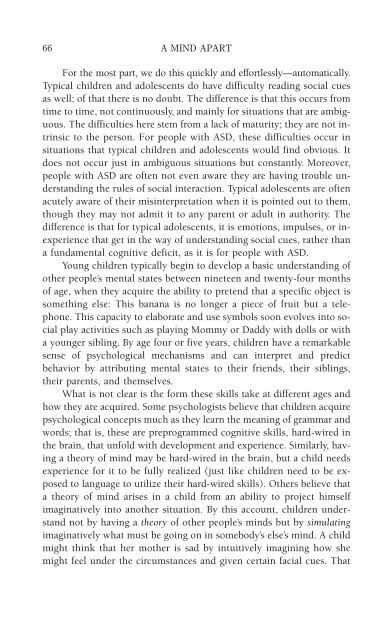978-1572305441
autism
autism
You also want an ePaper? Increase the reach of your titles
YUMPU automatically turns print PDFs into web optimized ePapers that Google loves.
66 A MIND APART<br />
For the most part, we do this quickly and effortlessly—automatically.<br />
Typical children and adolescents do have difficulty reading social cues<br />
as well; of that there is no doubt. The difference is that this occurs from<br />
time to time, not continuously, and mainly for situations that are ambiguous.<br />
The difficulties here stem from a lack of maturity; they are not intrinsic<br />
to the person. For people with ASD, these difficulties occur in<br />
situations that typical children and adolescents would find obvious. It<br />
does not occur just in ambiguous situations but constantly. Moreover,<br />
people with ASD are often not even aware they are having trouble understanding<br />
the rules of social interaction. Typical adolescents are often<br />
acutely aware of their misinterpretation when it is pointed out to them,<br />
though they may not admit it to any parent or adult in authority. The<br />
difference is that for typical adolescents, it is emotions, impulses, or inexperience<br />
that get in the way of understanding social cues, rather than<br />
a fundamental cognitive deficit, as it is for people with ASD.<br />
Young children typically begin to develop a basic understanding of<br />
other people’s mental states between nineteen and twenty-four months<br />
of age, when they acquire the ability to pretend that a specific object is<br />
something else: This banana is no longer a piece of fruit but a telephone.<br />
This capacity to elaborate and use symbols soon evolves into social<br />
play activities such as playing Mommy or Daddy with dolls or with<br />
a younger sibling. By age four or five years, children have a remarkable<br />
sense of psychological mechanisms and can interpret and predict<br />
behavior by attributing mental states to their friends, their siblings,<br />
their parents, and themselves.<br />
What is not clear is the form these skills take at different ages and<br />
how they are acquired. Some psychologists believe that children acquire<br />
psychological concepts much as they learn the meaning of grammar and<br />
words; that is, these are preprogrammed cognitive skills, hard-wired in<br />
the brain, that unfold with development and experience. Similarly, having<br />
a theory of mind may be hard-wired in the brain, but a child needs<br />
experience for it to be fully realized (just like children need to be exposed<br />
to language to utilize their hard-wired skills). Others believe that<br />
a theory of mind arises in a child from an ability to project himself<br />
imaginatively into another situation. By this account, children understand<br />
not by having a theory of other people’s minds but by simulating<br />
imaginatively what must be going on in somebody’s else’s mind. A child<br />
might think that her mother is sad by intuitively imagining how she<br />
might feel under the circumstances and given certain facial cues. That



